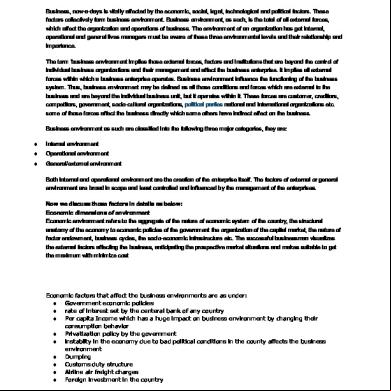This document was ed by and they confirmed that they have the permission to share it. If you are author or own the copyright of this book, please report to us by using this report form. Report 2z6p3t
Overview 5o1f4z
& View Assignment 1 ( Concept, Meaning & Kinds Of Property) as PDF for free.
More details 6z3438
- Words: 925
- Pages: 2
Assignment 1- Concept, Meaning & Kinds of Property Concept of Property Property has a very wider meaning in its real sense. It not only includes money and other tangible things of value, but also includes any intangible right considered as a source or element of income or wealth. The right and interest which a man has in lands and chattels to the exclusion of others. It is the right to enjoy and to dispose of certain things in the most absolute manner as he pleases, provided he makes no use of them prohibited by law. The sea, the air, and the like, cannot be appropriated; every one may enjoy them, but no one has any exclusive right in them. When things are fully our own, or when all others are excluded from meddling with them, or from interfering about them, it is plain that no person besides the proprietor, who has this exclusive right, can have any claim either to use them, or to hinder him from disposing of them as he pleases; so that property, considered as an exclusive right to things, contains not only a right to use those things, but a right to dispose of them, either by exchanging them for other things, or by giving them away to any other person, without any consideration, or even throwing them away. Meaning and Definition of Property Meaning of property In general sense, property is any physical or virtual entity that is owned by an individual or tly by a group of individuals. An owner of the property has the right. Human life is not possible without property. It has economic, socio-political, sometimes religious and legal implications. It is the legal domain, which institutes the idea of ownership. The basic postulate of the idea is the exclusive control of an individual over some ‘thing’. Here the most important aspect of the concept of ownership and property is the word ‘thing’, on which a person has control for use. To consume, sell, rent, mortgage, transfer and exchange his property. Property is any physical or intangible entity that is owned by a person or tly by a group of people. Depending on the nature of the property, an owner of property has the right to consume, sell, rent, mortgage, transfer, exchange or destroy their property, and/or to exclude others from doing these things. Definition of property There are different definitions are given in different act as per there uses and needs. But in the most important act which exclusively talks about the property and rights related to property transfer of property act 1882 has no definite definition of the term property. But it is defined in some other act as per their use and need. Those definitions are as follows: Section 2(c) of the Benami Transactions (Prohibition) Act, 1988 defines property as: “Property” means property of any kind, whether movable or immovable, tangible or intangible, and includes any right or interest in such property. Section 2 (11) of the Sale of Good Act, 1930 defines property as: “Property” means the general property in goods, and not merely a special property.
Kinds of Property Basically, Property is divided into real property, and personal property. Property is also divided, into absolute and qualified, when it consists of goods and chattels. Absolute property is that which is our own, without any qualification whatever; as when a man is the owner of a watch, a book, or other inanimate thing: or of a horse, a sheep, or other animal, which never had its natural liberty in a wild state. Qualified property consists in the right which men have over wild animals which they have reduced to their own possession, and which are kept subject to their power; as a deer, a buffalo, and the like, which are his own while he has possession of them, but as soon as his possession is lost, his property is gone, unless the animals, go animo revertendi. Property is again divided into corporeal and incorporeal. The former comprehends such property as is perceptible to the senses, as lands, houses, goods, merchandise and the like; the latter consists in legal rights, as chooses in action, easements, and the like. Intellectual property Intellectual property is a term referring to a number of distinct types of creations of the mind for which property rights are recognized—and the corresponding fields of law. Tangible and Intangible property: Tangible property Tangible property refers to any type of property that can generally be moved (i.e., it is not attached to real property or land), touched or felt. These generally include items such as furniture, clothing, jewellery, art, writings, or household goods. Intangible property: Intangible property refers to personal property that cannot actually be moved, touched or felt, but instead represents something of value such as negotiable instruments, securities, service (economics), and intangible assets including chose in action Movable and Immovable property Movable property The definition of movable property is given differently in many acts. Some of the definitions are as follows: Section 3 (36) of the General Clauses Act defines movable property as: 'Movable property shall mean property of every description, except immovable property." Immovable property According to Section 3 of that Act, "Immovable Property" does not include standing timber, growing crops or grass. Thus, the term is defined in the Act by excluding certain things. "Buildings" constitute immovable property and machinery, if embedded in the building for the beneficial use thereof, must be deemed to be a part of the building and the land on which the building is situated.
Kinds of Property Basically, Property is divided into real property, and personal property. Property is also divided, into absolute and qualified, when it consists of goods and chattels. Absolute property is that which is our own, without any qualification whatever; as when a man is the owner of a watch, a book, or other inanimate thing: or of a horse, a sheep, or other animal, which never had its natural liberty in a wild state. Qualified property consists in the right which men have over wild animals which they have reduced to their own possession, and which are kept subject to their power; as a deer, a buffalo, and the like, which are his own while he has possession of them, but as soon as his possession is lost, his property is gone, unless the animals, go animo revertendi. Property is again divided into corporeal and incorporeal. The former comprehends such property as is perceptible to the senses, as lands, houses, goods, merchandise and the like; the latter consists in legal rights, as chooses in action, easements, and the like. Intellectual property Intellectual property is a term referring to a number of distinct types of creations of the mind for which property rights are recognized—and the corresponding fields of law. Tangible and Intangible property: Tangible property Tangible property refers to any type of property that can generally be moved (i.e., it is not attached to real property or land), touched or felt. These generally include items such as furniture, clothing, jewellery, art, writings, or household goods. Intangible property: Intangible property refers to personal property that cannot actually be moved, touched or felt, but instead represents something of value such as negotiable instruments, securities, service (economics), and intangible assets including chose in action Movable and Immovable property Movable property The definition of movable property is given differently in many acts. Some of the definitions are as follows: Section 3 (36) of the General Clauses Act defines movable property as: 'Movable property shall mean property of every description, except immovable property." Immovable property According to Section 3 of that Act, "Immovable Property" does not include standing timber, growing crops or grass. Thus, the term is defined in the Act by excluding certain things. "Buildings" constitute immovable property and machinery, if embedded in the building for the beneficial use thereof, must be deemed to be a part of the building and the land on which the building is situated.










